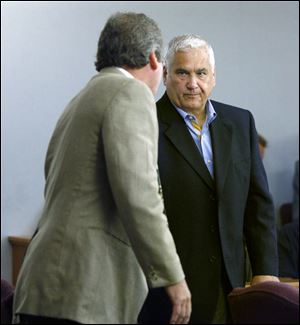
Conviction alternative asked in tax case
9/1/2010
Lawyer Joseph Solomon, left, confers in court with his client Tom Cousino in the court session in which Mr. Cousino asked to enter a pretrial diversion program.
Toledo restaurateur Tom Cousino left a Lucas County Common Pleas courtroom Tuesday saying that he hoped the allegations that he has not paid thousands of dollars in sales taxes on his businesses would soon be in his past.
"I think it's acceptable, yeah. Perfect? No," he said of his request to enter a pretrial diversion program. "We just have to make things move. This is the easiest way to do that."
Mr. Cousino, 64, of Perrysburg was charged with one count each of grand theft and failure to remit Ohio sales taxes withheld, both fourth-degree felonies, for allegedly failing to pay to pay a total of $80,915.91 in sales taxes - excluding penalties and interest - to the state of Ohio.
Had he been convicted on the charges, he could have faced up to three years in prison.
Tuesday, he withdrew his not guilty plea to each count and requested that he be screened for diversion. Judge Frederick McDonald referred him to the probation department to determine whether he is eligible and set a Sept. 28 hearing date.
"It will bring some closure and give us some time to get where we need to be," Mr. Cousino said.
Mr. Cousino was indicted on criminal charges April 23, the result of a lengthy investigation by the Ohio Department of Taxation. According to the indictment, Mr. Cousino failed to remit sales tax between February, 2008, and February, 2010.
Department of Taxation records indicate that the charges relate to his business Dri-Car-To Corp., which does business as Cousino's Steakhouse, 1842 Woodville Rd. As owner-operator of the corporation, Mr. Cousino was listed as the responsible party in the investigation, records indicate.
Specifically, the complaint alleges that Mr. Cousino failed to pay 10 returns for the restaurant between February and October of 2008 and again in January, 2010. Each of the missed payments totaled about $10,000.
According to Ohio law, pretrial diversion programs are for criminal defendants who authorities believe will not offend again. Repeat offenders and those accused of violent crimes are not eligible for the program.
If found eligible, Mr. Cousino would be supervised and be required to pay the amount of outstanding tax liability owed in the case. If the program is completed successfully, the criminal charges against Mr. Cousino would be dismissed.
Assistant County Prosecutor Frank Spryszak said that Mr. Cousino's lack of any prior contact with the court system made diversion a possible solution. He added that despite Mr. Cousino's past failures to pay his taxes in full, he has been making payments and authorities believed him to be a quality candidate for the program.
Mr. Spryszak said that diversion is offered to anyone who meets the program requirements. He said that participants who are found eligible then must decide whether they are interested in participating in the diversion program.
If accepted for the program, Mr. Cousino would be making payments to the county clerk of court's office, allowing the court to better monitor the amounts paid, he added.
Not all defendants screened for the program are accepted, and not all participants will complete the program successfully.
Mr. Spryszak said the charges are being held in abeyance, so if Mr. Cousino fails to pay the taxes owed within the period allotted to him during the program, the charges will be reinstated. "This is not a circumstance of where the charges are being dismissed and we're going on his word. If he fails to pay what he owes, we will move forward on the prosecution," the prosecutor said.
According to the Ohio Department of Taxation, several steps are taken to work with businesses that are late in paying sales tax before criminal charges are presented to the local county prosecutor's offices for review. Often businesses are put on payment plans and have three chances after enrollment in the program to make regular payments before action is taken, the department has said.
Tuesday, Mr. Cousino said he is still surprised by the allegations and believes that he paid much of the money owed. He said he hopes to use the upcoming time to pinpoint exactly the amount owed.
Mr. Cousino's attorney, Joe Solomon, said that the requirements placed on his client would be little more than continuing to live a law-abiding life.
"It encompasses him doing exactly what he's done all his life, abide the law, with the added part of paying restitution," Mr. Solomon said. "This is not going to change Tom's life at all."
Contact Erica Blake at:
eblake@theblade.com
or 419-213-2134.